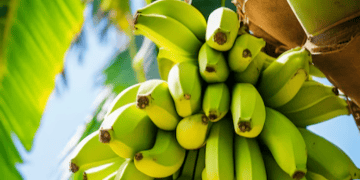Recent research indicates that climate change could substantially reduce banana-growing areas in major exporting countries by 2080. A study conducted by the University of Exeter, published in Nature Food, projects that rising temperatures may render it economically unviable for many regions in Latin America and the Caribbean to continue banana cultivation for export.
Bananas, a crucial export commodity valued at approximately $11 billion annually, are vital to the economies of numerous countries. The study suggests that without significant interventions to address climate change, 60% of the current banana-producing areas could struggle to sustain production by 2080.
The research highlights that socioeconomic factors, such as labor availability and infrastructure, significantly constrain adaptation efforts. Most banana production occurs near densely populated areas and ports, limiting the potential for relocation to more suitable regions.
Professor Dan Bebber, who led the study, emphasized the urgency of the situation, stating that without substantial investment in adaptation strategies—such as irrigation infrastructure and the development of heat-tolerant banana varieties—the future of export banana production appears uncertain.
The study utilized satellite imagery to map banana production in Latin America and the Caribbean at high resolution, estimating the climate conditions under which bananas are optimally grown. Findings indicate that climate change will reduce the best areas for banana growth and yields in many important producer countries, as well as increase worker exposure to extreme temperatures.
Countries such as Colombia and Costa Rica are expected to be among the most negatively impacted, potentially becoming too hot for optimal cultivation. Conversely, Ecuador and parts of Brazil may remain significant producers, as projections suggest less severe climate impacts in these regions.
The researchers propose several adaptation strategies, including expanding irrigation infrastructure, breeding heat- and drought-tolerant banana varieties, and supporting banana producers in managing climate risks.
This study underscores the pressing need for global agricultural sectors to proactively address the challenges posed by climate change to ensure food security and the sustainability of key export industries.
Stay current with supply chain report news at The Supply Chain Report. For international trade tools, see ADAMftd.com.
#ClimateChangeImpact #BananaProduction #SustainableAgriculture #FoodSecurity #AgricultureResilience #LatinAmericaFarming #BananaExport #GlobalWarmingEffects #FutureOfFarming #CropAdaptation #Agribusiness #NatureFoodStudy #UniversityOfExeter












